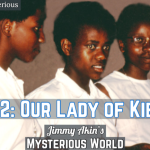
Our Lady of Kibeho (Marian Apparition)
Jimmy Akin's Mysterious World
00:00
How Does Hebrew Genealogy Work?
In ancient israel, they commonly did things like skip generations. In hebrew, the word for father also means grandfather and great grandfather. And so that makes it very easy to skip generations. Another thing that happens in hebrew genealogies is you a can have posthumous adoptions. So given that this is the oldest set of genealogies describing a prime eval period in earthe history, there may be a large degree of reconstruction here.
Play episode from 01:02:27
Transcript

 In 1981, a group of children in Rwanda began reporting visions of the Virgin Mary. Jimmy Akin and Dom Bettinelli discuss her assurances of God's love and warnings of a terrible disaster; what the girls reported to have seen and heard; and the results of the Church's investigations, including warnings for believers.
In 1981, a group of children in Rwanda began reporting visions of the Virgin Mary. Jimmy Akin and Dom Bettinelli discuss her assurances of God's love and warnings of a terrible disaster; what the girls reported to have seen and heard; and the results of the Church's investigations, including warnings for believers.
